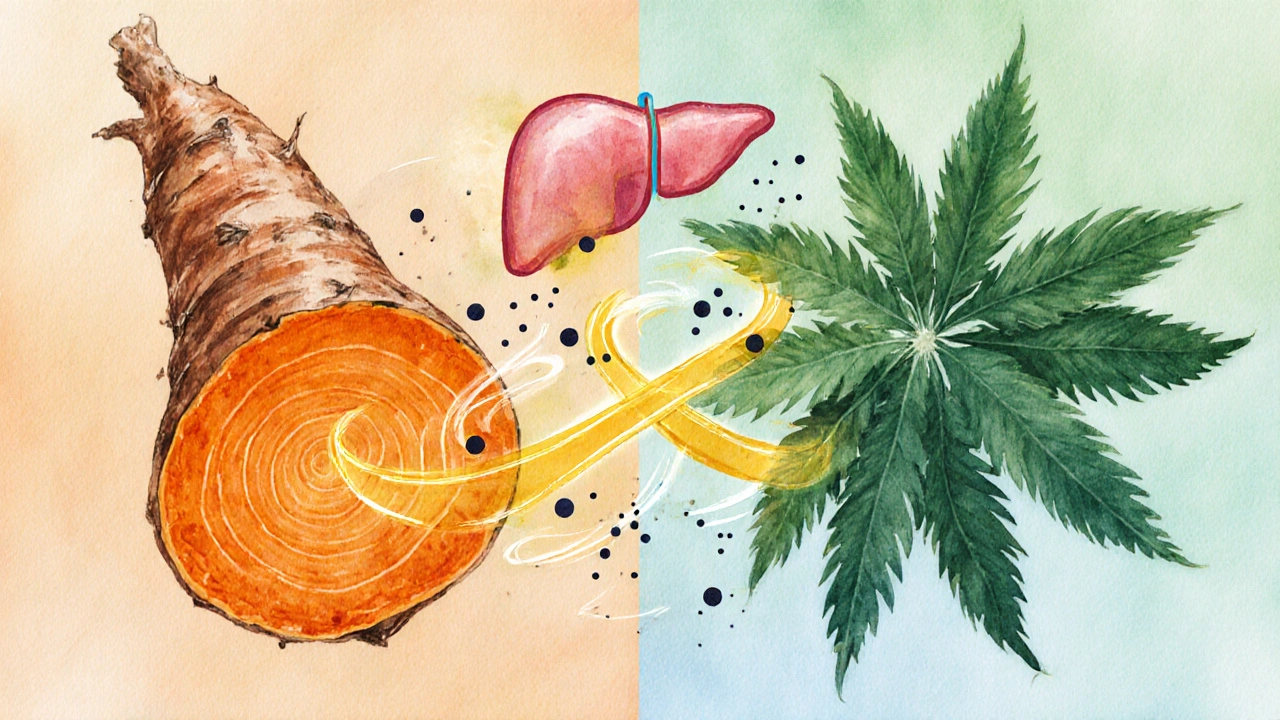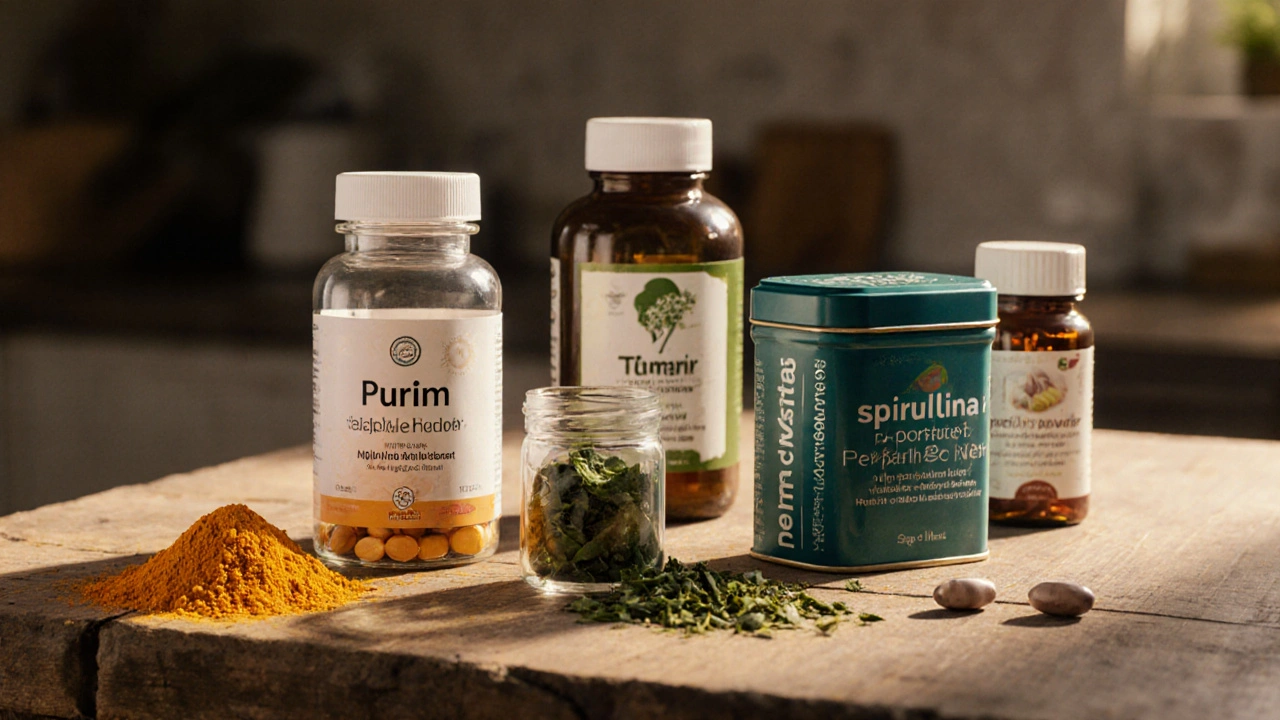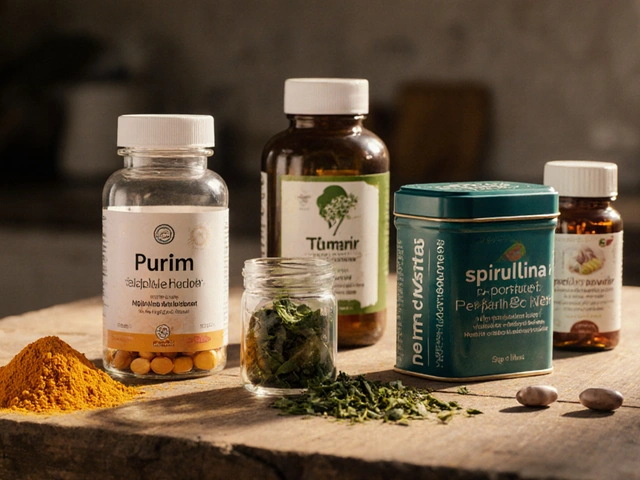Purim vs Natural Alternatives Comparison Tool
| Product | Main Active Compounds | Primary Benefit | Typical Dose | Monthly Cost (NZD) | Important Notes |
|---|---|---|---|---|---|
| Purim | Curcumin + Azadirachtin | Joint Inflammation Liver Detox | 2 capsules (≈400 mg curcumin, 250 mg neem) | ≈$35 | Gallbladder disease, blood-thinners |
| Turmeric (Standardized) | Curcumin + Piperine | Anti-inflammatory | 1-2 capsules (500 mg curcumin) | ≈$20 | Gallbladder issues, ulcer meds |
| Neem Powder | Azadirachtin, Nimbidin | Detox Antimicrobial | 1 tsp (≈5 g) | ≈$15 | Pregnancy, low blood pressure |
| Milk Thistle | Silymarin | Liver Protection | 150 mg 2-3×/day | ≈$22 | Hormone-sensitive cancers |
| Spirulina | Phycocyanin, Protein | Antioxidant Boost | 3 g 1-2×/day | ≈$18 | Phenylketonuria, heavy-metal contamination |
| Garlic Extract | Allicin | Cardiovascular Immune Support | 300-600 mg 1-2×/day | ≈$12 | Bleeding disorders, surgery |
Quick Takeaways
- Purim blends turmeric and neem for anti‑inflammatory and detox benefits.
- Key alternatives include standalone turmeric, neem, milk thistle, spirulina, and garlic extract.
- Purim scores highest on combined antioxidant power but may be pricier than single‑herb options.
- Watch for digestive sensitivity if you have a sensitive stomach.
- Choose based on your primary goal: joint health, liver support, or overall immunity.
What is Purim?
When you see the name Purim is a herbal supplement that combines powdered turmeric (Curcuma longa) and neem leaf (Azadirachta indica) in a standardized capsule. The product is marketed for its dual action: turmeric supplies curcumin, a potent antioxidant, while neem adds anti‑microbial and liver‑supporting compounds. The blend is intended to deliver a broader spectrum of health benefits than either herb alone.
How Turmeric and Neem Work Together
Turmeric (Curcuma longa) contains curcumin, a polyphenol that blocks inflammatory pathways such as NF‑κB. Research from 2023 showed curcumin can reduce C‑reactive protein by up to 30% when taken at 500mg twice daily.
Neem (Azadirachta indica) offers azadirachtin and nimbidin, which have antibacterial and liver‑detoxifying effects. A 2022 clinical trial reported neem leaf powder lowered liver enzymes (ALT, AST) by 15% in participants with mild fatty liver.
When blended, turmeric’s anti‑inflammatory action pairs with neem’s detox support, creating a synergistic formula that tackles both inflammation and toxin clearance.
Top Natural Alternatives
If you’re curious about other options, here are the most common single‑herb or multi‑herb supplements that target similar health goals:
- Turmeric Capsules - pure curcumin extracts, often combined with black‑pepper piperine for better absorption.
- Neem Powder - focuses on antimicrobial and liver‑support benefits.
- Milk Thistle - silymarin protects liver cells and promotes regeneration.
- Spirulina - a blue‑green algae rich in protein, phycocyanin, and antioxidants.
- Garlic Extract - allicin provides cardiovascular and immune support.
- Green Tea Extract - EGCG offers strong antioxidant and metabolism‑boosting effects.

Side‑by‑Side Comparison
| Product | Main Active(s) | Primary Benefit | Typical Dose | Price (NZD/month) | Notable Contra‑indications |
|---|---|---|---|---|---|
| Purim | Curcumin+Azadirachtin | Joint inflammation + liver detox | 2 capsules (≈400mg curcumin, 250mg neem) | ≈$35 | Gallbladder disease, blood‑thinners |
| Turmeric (standardized) | Curcumin+Piperine | Anti‑inflammatory | 1-2 capsules (500mg curcumin) | ≈$20 | Gallbladder issues, ulcer meds |
| Neem Powder | Azadirachtin, Nimbidin | Detox + antimicrobial | 1tsp (≈5g) | ≈$15 | Pregnancy, low blood pressure |
| Milk Thistle | Silymarin | Liver protection | 150mg 2-3×/day | ≈$22 | Hormone‑sensitive cancers |
| Spirulina | Phycocyanin, Protein | Overall antioxidant boost | 3g 1-2×/day | ≈$18 | Phenylketonuria, heavy‑metal contamination |
| Garlic Extract | Allicin | Cardiovascular & immune | 300-600mg 1-2×/day | ≈$12 | Bleeding disorders, surgery |
Choosing Between Purim and the Alternatives
Here are the main decision points you should weigh:
- Goal focus: If you need both joint relief and liver support, Purim’s blended formula is the only one that hits both targets in a single pill.
- Budget: Single‑herb powders (turmeric or neem) are generally cheaper. A DIY blend of turmeric + neem can cost <10NZD/month, but you lose the convenience and standardized dosing.
- Digestive tolerance: Turmeric can irritate the stomach for some people. Neem is milder on the gut but may cause a bitter aftertaste.
- Supplement interactions: Blood‑thinners (warfarin, clopidogrel) should avoid high‑dose curcumin and garlic. If you’re on such meds, Milk Thistle or Spirulina may be safer.
- Evidence depth: Curcumin and silymarin have the most clinical trial data. Neem’s research is growing but still less extensive.
Potential Side Effects & Interactions
Even natural products can cause issues. Below is a quick rundown:
- Curcumin (turmeric): May cause nausea, diarrhea, or heartburn at >1g daily. Enhances the effect of anticoagulants.
- Neem: Can lower blood sugar; diabetics should monitor levels. High doses have been linked to liver enzyme elevation in rare cases.
- Milk Thistle: Generally well‑tolerated; mild GI upset possible.
- Spirulina: Risk of heavy‑metal contamination if sourced from polluted waters - choose certified organic brands.
- Garlic Extract: Bad breath, body odor, and increased bleeding risk.
Buying Tips & Dosage Guidance
When you decide what to buy, keep these pointers in mind:
- Check for third‑party testing (e.g., USP, NSF) to verify purity.
- Look for “standardized to X% curcumin” on turmeric products; 95% is the gold standard.
- For neem, ensure the label lists a minimum of 0.5% azadirachtin.
- Start low: If you’re new to Purim, begin with 1 capsule per day for two weeks, then increase to the full 2‑capsule dose.
- Take turmeric‑based supplements with a meal containing fat to improve absorption.
Frequently Asked Questions
Can I mix Purim with a separate turmeric supplement?
Yes, but you may exceed the safe curcumin threshold (about 2g per day). If you add extra turmeric, cut back on the Purim dosage to stay within 1-1.5g total curcumin.
Is Purim safe for pregnant or breastfeeding women?
Most manufacturers advise against use during pregnancy because high neem doses can affect hormonal balance. Consult a healthcare provider before starting.
How does Purim compare to a homemade turmeric‑neem powder?
A DIY blend can match the ingredient ratios but lacks the standardized extraction that guarantees each capsule contains 400mg curcumin and 250mg neem. Consistency and bioavailability are usually lower.
Will Purim interfere with my cholesterol‑lowering medication?
Turmeric can modestly enhance the effect of statins, leading to a slight increase in muscle soreness. Monitor symptoms and discuss dosage adjustments with your doctor.
What’s the best time of day to take Purim?
Take it with your main meal (preferably one containing some healthy fat) to boost curcumin absorption. Splitting the dose-one capsule at lunch, one at dinner-helps maintain steady blood levels.

